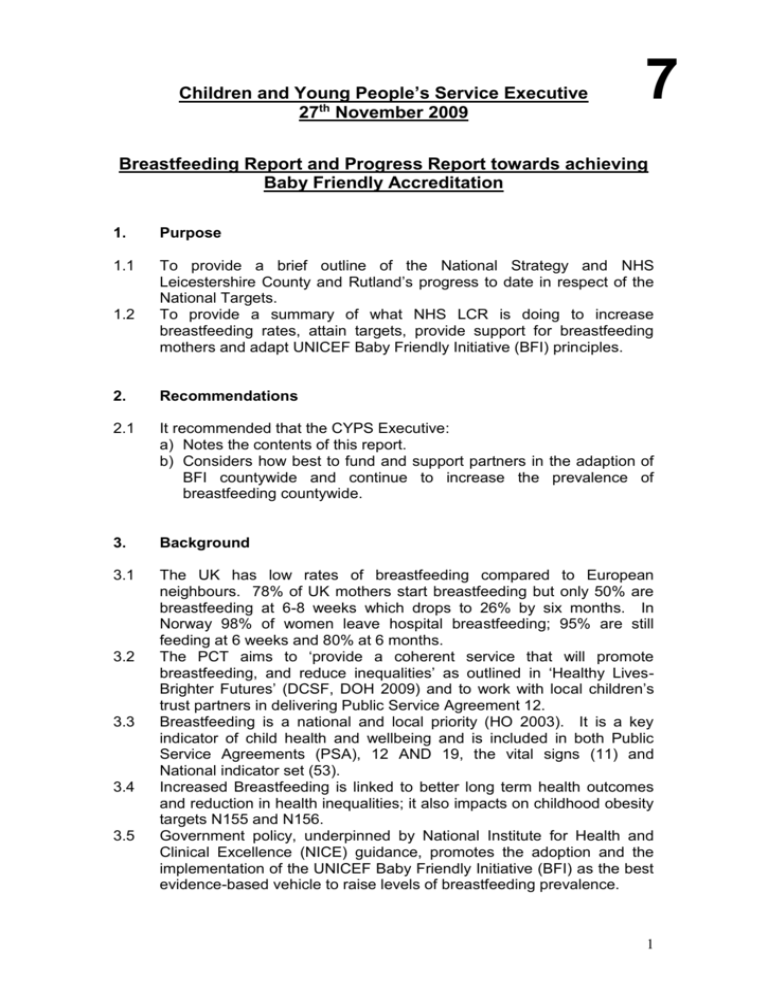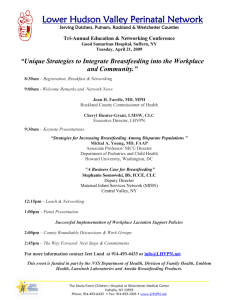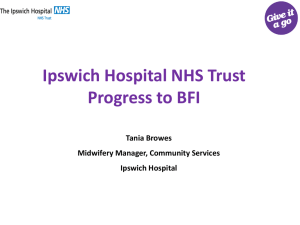Breastfeeding & Baby Friendly Accreditation Report Nov 09
advertisement

Children and Young People’s Service Executive 27th November 2009 7 Breastfeeding Report and Progress Report towards achieving Baby Friendly Accreditation 1. Purpose 1.1 To provide a brief outline of the National Strategy and NHS Leicestershire County and Rutland’s progress to date in respect of the National Targets. To provide a summary of what NHS LCR is doing to increase breastfeeding rates, attain targets, provide support for breastfeeding mothers and adapt UNICEF Baby Friendly Initiative (BFI) principles. 1.2 2. Recommendations 2.1 It recommended that the CYPS Executive: a) Notes the contents of this report. b) Considers how best to fund and support partners in the adaption of BFI countywide and continue to increase the prevalence of breastfeeding countywide. 3. Background 3.1 The UK has low rates of breastfeeding compared to European neighbours. 78% of UK mothers start breastfeeding but only 50% are breastfeeding at 6-8 weeks which drops to 26% by six months. In Norway 98% of women leave hospital breastfeeding; 95% are still feeding at 6 weeks and 80% at 6 months. The PCT aims to ‘provide a coherent service that will promote breastfeeding, and reduce inequalities’ as outlined in ‘Healthy LivesBrighter Futures’ (DCSF, DOH 2009) and to work with local children’s trust partners in delivering Public Service Agreement 12. Breastfeeding is a national and local priority (HO 2003). It is a key indicator of child health and wellbeing and is included in both Public Service Agreements (PSA), 12 AND 19, the vital signs (11) and National indicator set (53). Increased Breastfeeding is linked to better long term health outcomes and reduction in health inequalities; it also impacts on childhood obesity targets N155 and N156. Government policy, underpinned by National Institute for Health and Clinical Excellence (NICE) guidance, promotes the adoption and the implementation of the UNICEF Baby Friendly Initiative (BFI) as the best evidence-based vehicle to raise levels of breastfeeding prevalence. 3.2 3.3 3.4 3.5 1 3.6 The PSA 12 aims to increase the prevalence of breastfeeding in England with more mothers initiating breastfeeding and continuing beyond 6-8 weeks. The priorities and planning framework contains a target for breastfeeding to deliver an increase of two percentage points per year in the initiation rate, focussing especially on women from disadvantaged groups. Two national targets were set in an attempt to address this: - Record the prevalence of breastfeeding at 6-8 weeks. - Record the feeding status of all infants at 6-8 weeks. 4. Progress Towards Targets 4.1 Since 2007-2008 breastfeeding prevalence in Leicestershire County and Rutland has increased from 21.5% to 40.7% in 2008-2009. Nationally rates have steadily increased from 1995 and the infant feeding survey reported an incidence rate of 77% for England and Wales. LLR have registered their intent to work towards BFI accreditation, the first planning visit is due to take place 28.01.09. DOH bid money has been used to employ an Infant Feeding Coordinator (IFC) for Leicestershire County and Rutland for two years, who is currently working on an action plan to take BFI forward in the county. Data collection around breastfeeding targets continues to be improved, through the adaption of SystmOne and the training of staff to use this system. An Infant Feeding Strategy for LLR has been completed and agreed locally. (Appendix A) An action plan has been developed to work towards maintaining and continuing achievement of targets as well as establishing a steering group that meets regularly. The PCT will continue to monitor quarterly returns and will endeavour in enhancing partnership working to include qualitative feedback from service users and providers. The PCT will engage partners from primary care, health visitors, midwives, children’s services, local authority and voluntary sector who are well placed to monitor prevalence, service effectiveness and identify barriers to assist them in improving performance. The PCT will ensure that services delivered are to the quality standards that are set out in BFI and NICE and are having a positive and measurable impact on outcomes and reducing inequalities. A Better Outcomes Achieved Together (BOAT) action plan has been formulated and is being progressed jointly between local authority and health. (Appendix B) 4.2 4.3 4.4 4.5 4.6 4.7 4.8 4.9 4.10 2 5. Risks to Achieving Targets and BFI Status 5.1 Allocation of funds to ensure accreditation. Although funding has been received this year, continued investment is required to ensure that targets are continually met and long term improvements made. Commitment and sign up from all partners to achieve BFI. Success will only be achieved if all partners sign up and work together. Professional barriers – Health visitors, midwives and other health care professionals to continue together to ensure continuity of care and improved service delivery. 5.2 5.3 6. Recommendations 6.1 6.2 6.3 Adoption of the infant feeding strategy by all partners. Adoption of the breastfeeding policy by all partners. Joint planning with partner agencies to progress BFI including LA representation at Infant Feeding Strategy Group. Partners in LA to adopt BFI status within their premises and environment, e.g. facilities for breastfeeding in public buildings, children’s centres and disseminate this information to members of the public. Progress with detailed mapping of breastfeeding support available through health, local authority and the voluntary sector. Provision of joint peer support, joint training sessions for all staff across all partner organisations who work with and support mothers. Consider making breastfeeding training mandatory. Once the mapping is complete, any gaps identified in service provision will be used in conjunction with other intelligence available by the PCT to decide on priorities, which will influence commissioning, to address inequalities in areas of highest need. To pursue with support from CYPSE an overarching action plan incorporating existing plans from UHL, CHS, and voluntary sector. 6.4 6.5 6.6 6.7 6.8 6.9 7. Financial Implications 7.1 NHS LCR have now committed £44k to support our main provider UHL to progress with BFI accreditation this current year. DOH money (£97k) secured earlier has been used to fund IFC for the County. Allocation of funding (£44k) will be split between: a) Training of staff across all disciplines. b) Employment of IFC c) Development and expansion of peer support. d) Resources, information, communication. We would now like commitment from partners around resources to implement BFI, use of premises joint working and delivery of breastfeeding support through the children’s centres. 7.2 7.3 3 8. Equalities Issues Implications 8.1 The HEA highlighted priority areas with poorer health outcomes and inequalities, which breastfeeding can impact on. Through partnership work with local authority, provider in acute and primary care the PCT will formulate priorities to take forward. The current review of maternity and neonatal services which is being carried out in partnership with our provider will highlight areas which impact on the initiation of breastfeeding and barriers to continuation. Through ‘Maternity Matters’ (DOH 2007) action plan, the PCT can monitor and ensure that breastfeeding support is provided for mothers in line with recommendations. 8.2 8.3 8.4 4

